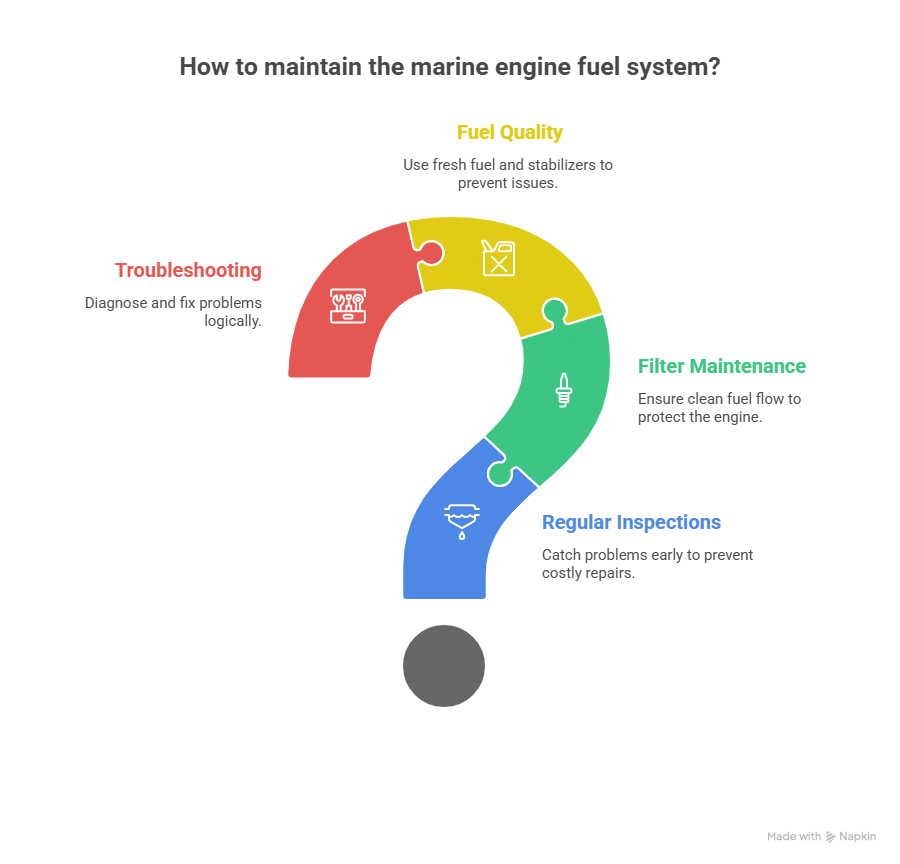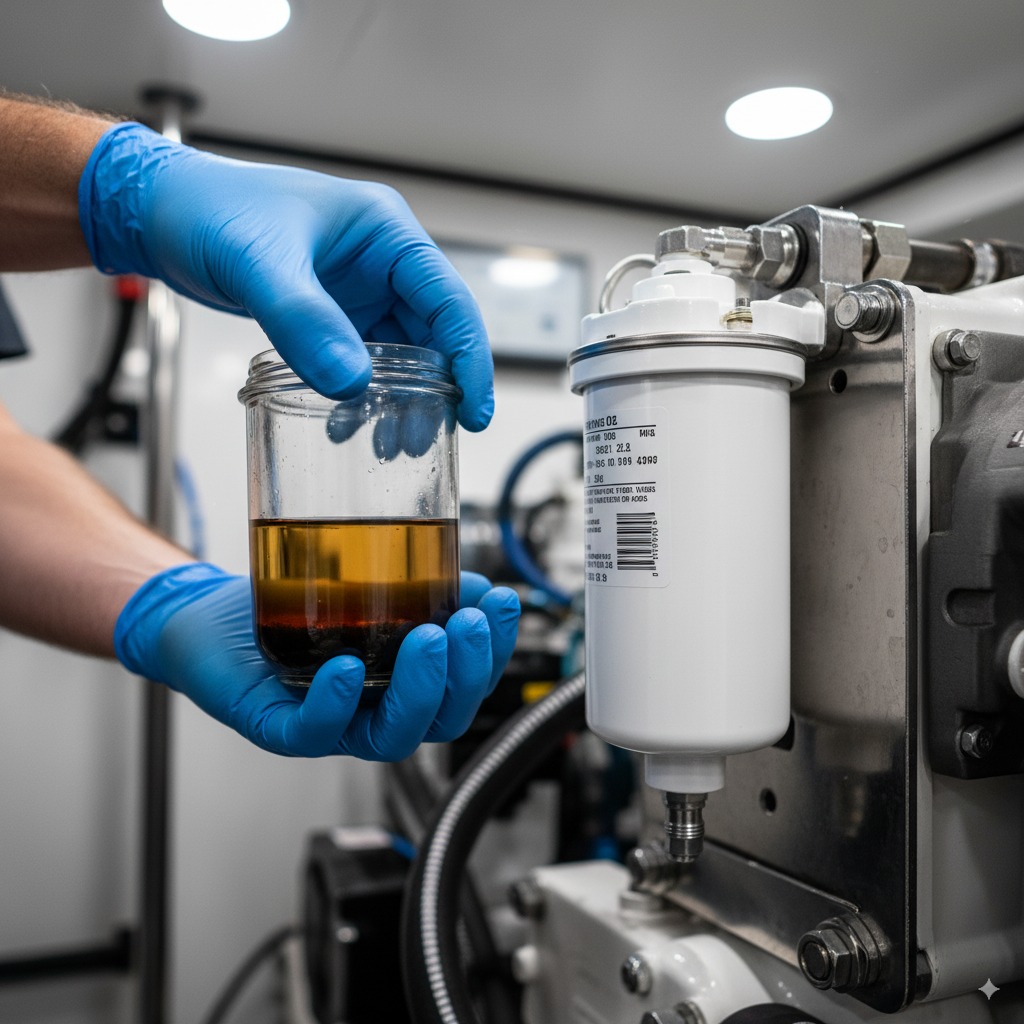I’ve been a marine mechanic in South Florida for 20 years, and if you ask me what causes the most ruined weekends, it’s not engine explosions or hitting a reef. It’s the fuel system. I’d say about 70% of the boats I get towed to my shop are because of a fuel issue that could have been prevented.
I remember a guy named Dave with a beautiful 30-foot center console. He called me in a panic, stranded five miles offshore. His engines sputtered and died. He was sure he needed a major overhaul. I got out there, and what did I find? A primary fuel filter so clogged with water and gunk it looked like a science experiment. A simple, $20 part shut down his $200,000 boat. That day taught him a valuable lesson about fuel system maintenance in marine engines.
Your boat’s fuel system is its lifeline. It’s what turns that tank of diesel or gasoline into forward motion. When it’s working right, you don’t even think about it. But when it fails, it fails completely. So, let’s go through how to keep it healthy, based on what I’ve seen in my shop year after year. This isn’t just about fixing things; it’s about making sure they never break in the first place.
Table of Contents
The Parts of the Puzzle: What’s in Your Fuel System?
Before you can fix it, you need to know what you’re looking at. The path fuel takes is pretty logical:
- The Tank: Where the fuel lives and, unfortunately, where water from condensation likes to collect.
- The Lines: Simple hoses that carry the fuel, but they get old, crack, and chafe.
- The Primer Bulb: That little rubber bulb on outboard lines. It’s your first clue if there’s an air leak.
- The Filters: You have at least two. A primary filter (the water separator) and a secondary (engine) filter. They are the guardians of your engine.
- The Fuel Pump: This pushes the fuel to the engine. It can be mechanical or electric.
- Injectors or Carburetor: The last stop, where fuel is mixed with air for combustion.
Understanding this flow is crucial for effective fuel system maintenance in marine engines. A problem anywhere along this chain can bring everything to a halt.
The Easiest Fix: Regular Inspections
The best tool you have is your own eyes and nose. Catching a problem early is the cheapest way to fix it.
- Before Every Trip: Do a quick “sniff test” around the engine and fuel tank. The smell of raw fuel means you have a leak. Don’t leave the dock until you find it. Squeeze the primer bulb—it should get firm. If it stays mushy, you’ve got an air leak.
- Monthly Checks: Take a closer look. Inspect the fuel lines for any cracks, bulges, or soft spots, especially around clamps and fittings. If a hose feels mushy, replace it. Check any clear filter bowls for water or debris. If you see either, it’s time to drain the bowl and change the filter. This simple habit is a core part of fuel system maintenance in marine engines.

Filters, Filters, Filters: Your Engine’s Best Friend
If you do nothing else, pay attention to your fuel filters. They are cheap insurance against expensive injector or fuel pump repairs.
I tell my clients to change their filters every 100 hours or once a season, whichever comes first. If you get a bad batch of fuel, change them immediately.
Here’s a quick comparison of the two main types:
| Filter Type | What It Does | My Advice |
|---|---|---|
| Primary Filter | Catches the big stuff and separates out water. It’s your first line of defense. | This is the one you need to check and drain often, especially in humid climates. |
| Secondary Filter | Mounts on the engine and provides fine filtration right before the fuel enters the sensitive parts. | Change this one every time you change the primary. Don’t skip it. |
Pro Tip: Always carry spare filters and a filter wrench on your boat. Being able to change a clogged filter at sea can turn a disaster into a minor inconvenience. And when you install a new filter, always pre-fill it with fresh, clean fuel and lubricate the gasket with a little diesel or oil. This is a must-do step in fuel system maintenance in marine engines.
The Fuel Itself: Quality and Storage
You can have the best filters in the world, but they can’t fix bad fuel.
- Buy from a Busy Place: Get your fuel from a marina or gas station with high turnover. This means the fuel is more likely to be fresh and clean.
- Use a Stabilizer: If your boat is going to sit for more than a few weeks, use a good marine fuel stabilizer. It prevents the fuel from breaking down and gumming up your system. It’s a cheap and easy part of fuel system maintenance in marine engines.
- For Diesel Owners: The “diesel bug” (microbial growth) is real. It lives in the water at the bottom of your tank and can clog your entire system. Using a biocide additive, especially during storage, is essential. Also, try to keep your tanks as full as possible to reduce condensation.
When It Acts Up: Basic Troubleshooting
When your engine sputters or won’t start, don’t panic. Think logically.
- Engine Won’t Start or Runs Rough: 9 times out of 10, it’s a clogged filter. Start there.
- Engine “Hunts” for RPMs: If the RPMs are fluctuating up and down, you likely have an air leak somewhere in the system. Check all your connections and the primer bulb.
- No Fuel at All: If you have an electric fuel pump, you should hear it hum for a second when you turn the key. If it’s silent, you might have a bad pump or an electrical issue.
Properly diagnosing a problem is a huge part of fuel system maintenance in marine engines. Don’t just start replacing parts randomly.
FAQ: Questions I Get Asked All the Time
How often should I really change my fuel filters?
Every 100 hours or annually. No excuses. It’s the cheapest maintenance you can do.
What’s the best way to deal with ethanol in gasoline?
Avoid it if you can. If you can’t, use a stabilizer and an ethanol treatment additive. Ethanol attracts water and destroys older rubber fuel lines.
My diesel engine is losing power. What should I check first?
Your filters. A clogged filter will starve the engine of fuel under load. It might seem fine at idle but will fall on its face when you throttle up.
Is professional fuel polishing worth it?
If you have a chronic problem with dirty fuel or algae in your diesel tank, yes. It’s the only way to truly clean the fuel you have. But for most boats, regular filtering and good fuel habits are enough.
What is the most overlooked part of fuel system maintenance in marine engines?
The tank vent. I’ve seen engines starve for fuel because a little mud dauber built a nest in the vent line, creating a vacuum in the tank. Check to make sure it’s clear.
Key Takeaways: My Final Advice
Look, you don’t need to be a master mechanic to handle basic fuel system maintenance in marine engines. It all comes down to being proactive. This is the stuff that really matters:
- Your Fuel System is Your Lifeline: Treat it with respect. A happy fuel system means a happy engine.
- Inspect, Inspect, Inspect: Use your eyes and nose. Catching a leak or a bad hose early can save your whole season.
- Filters Are Your Hero: Change them religiously. Carry spares. It’s the most important part of routine fuel system maintenance in marine engines.
- Good Fuel In, Good Performance Out: Don’t put questionable fuel in your boat. Use stabilizers. Your engine will thank you.
- Know When to Call for Help: Don’t be afraid to call a professional. If you’re dealing with a major leak or a complex diesel injection issue, it’s better to be safe than sorry.
Start today. Go check your fuel filter bowl for water. Order a set of spare filters to keep on board. This small investment in fuel system maintenance in marine engines will pay you back with reliability and peace of mind every time you leave the dock.
Author Bio
I’m Alex, a 20-year marine mechanic based in South Florida, with an ABYC certification in marine diesel and gasoline engines. I’ve specialized in fuel system maintenance in marine engines for my entire career, troubleshooting and repairing everything from clogged outboard carburetors to complex common-rail diesel systems at marinas like Bahia Mar and Dinner Key.


Leave a Reply